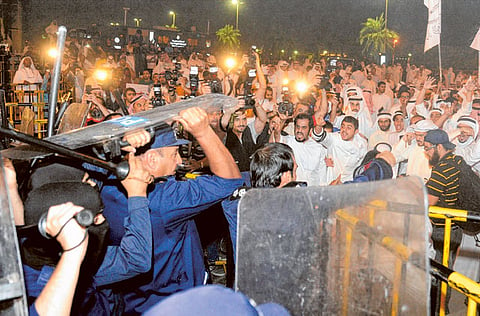Kuwait parliamentary election set for December 1
Cabinet approves emir's decision to amend the controversial electoral law

Manama: Kuwait’s cabinet on Saturday drafted a decree that would amend the controversial electoral law by reducing the number of candidates a voter can elect from five to only one.
The draft, to be submitted to the Emir for endorsement, kept the number of constituencies to five as stipulated in the 2006 law.
The Emir Shaikh Sabah Al Ahmad Al Jaber Al Saber on Friday evening called for the amendment in an address to the nation.
The government at its extraordinary session suggested that holding the parliamentary elections on December 1.
The elections would be the second to be held in 2012, an unprecedented development in the northern Arabian Gulf country that has been rocked by a deep political and constitutional crisis.
The move by the government to amend the law and the expected endorsement by the Emir are likely to be resisted by an increasingly vociferous opposition.
Several former lawmakers on Friday evening and on Saturday called for staging rallies on Sunday to express their disapproval.
The opposition has long threatened to apply street pressure on the government if the electoral law was amended amid claims that they were the real target of the changes.
Street rallies were staged in the summer ahead of the ruling by the Constitutional Court on the constitutionality of the electoral law.
The government in August requested the country’s highest court to look into it, arguing that there were legal loopholes that could mean challenges to any national election. The government also argued that the amendment was necessary to ensure a fair representation of the people in the parliament.
However, the opposition charged that the government was working on ensuring a more compliant parliament.
The court on September 25 rejected the case, giving the opposition a sense of victory that however quickly subdued after it became aware of the Emir’s prerogatives to sign an amendment through a decree of necessity.
The opposition resorted again to street pressure and staged several rallies to ensure that the law is not amended.
A request by the Emir to suspend demonstrations as the country hosted last week the first Asian Cooperation Dialogue summit, a forum of 32 countries, was turned down in a clear indication of the tense relations between the opposition and the government.
On Friday, Shaikh Sabah drew a gloomy picture of the situation in Kuwait and blamed it on hollow words and fake acts of heroism.
On Saturday, Kuwait appeared more divided than ever before.
Several opposition figures said that they would boycott the elections, both as voters and as candidates. Two news sites posted that they would not report on the elections. Their decision drew cheers from supporters and criticism from those who blamed them for failing as media to take neutral stances.
Other former MPs said that they backed the move by the Emir and the government and that they would be actively involved in the parliamentary elections.
Sign up for the Daily Briefing
Get the latest news and updates straight to your inbox



